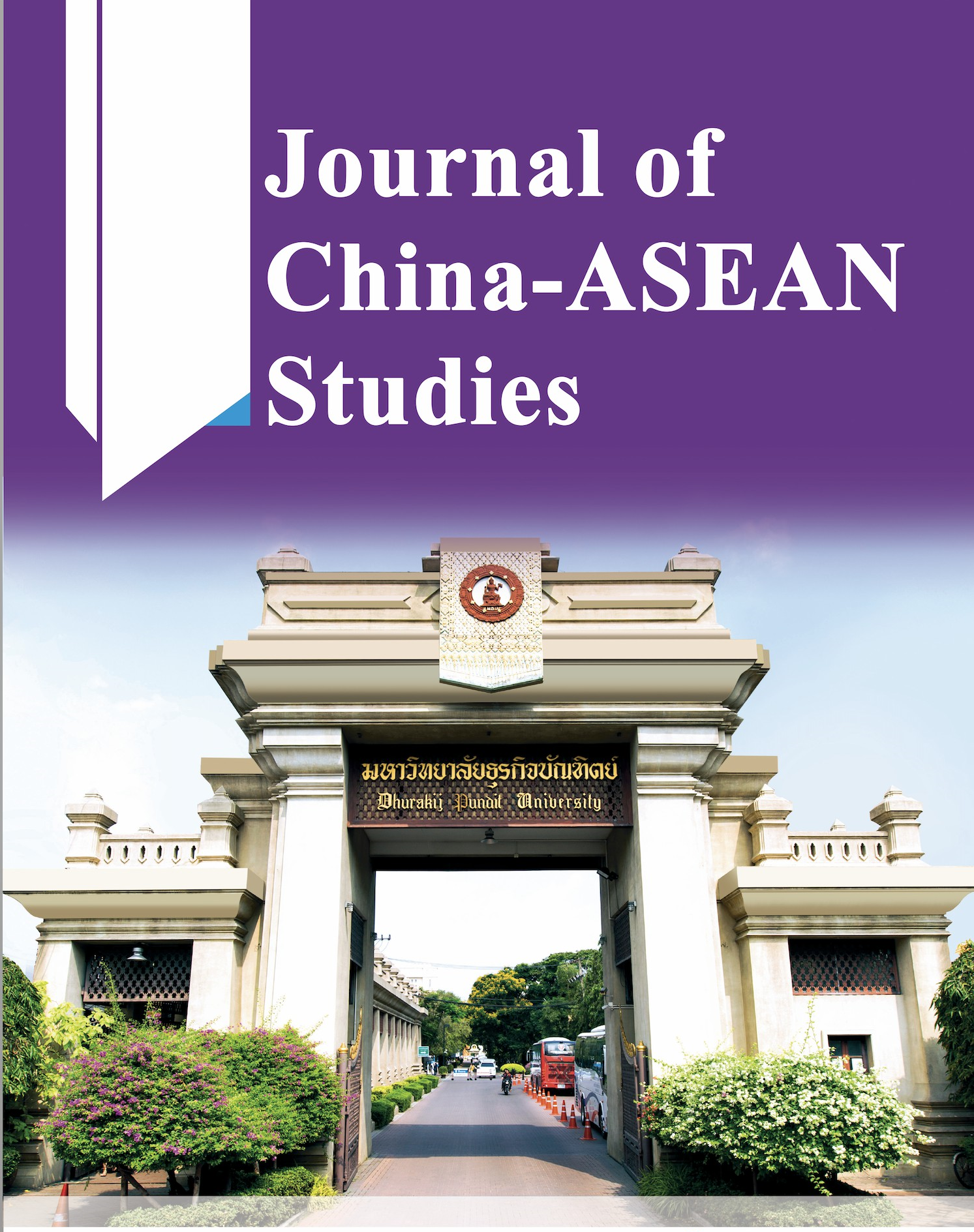Construction of the Model of Factors Affecting Chinese College and University Students’ Learning Behavior during the COVID-19 Pandemic
Keywords:
COVID-19 Pandemic, Online Teaching, Students, Learning Behavior, Model of FactorsAbstract
This paper carries out a study on the changes in the learning behavior, academic performance, learning psychology, and development expectation of Chinese university and college students due to the online teaching method during the COVID-19 pandemic through criterion sampling. The model of factors affecting students’ learning behavior during the COVID-19 pandemic was built based on grounded theory and iceberg theory through a semi-structured interview with 20 students from different universities and colleges in Guizhou, Guangxi, and Guangdong, China. This study obtained data by completing the determination of research direction, proposing interview outline, signing interview agreement with interviewees, simulating interview training and formal interview. This model includes the core coding of “explicit behavior and implicit behavior”, the associative coding of “learning ability”, “practical ability”, “development capability”, “learning feeling”, and “personality and intrinsic motivation”, and open coding of 21 items such as attention, observation power, and memory.
References
Agnihotri, L., Aghababyan, A., Mojarad, S., Riedesel, M. and Essa, A. (2015). Mining login data foractionable student insight. International Educational Data Mining (EDM). (pp. 472-474). https://eric.ed.gov/?id=ED560906
Charmaz, K. (2014). Constructing grounded theory (2nd ed.). Sage.
Clift, R. T., & Brady, P. (2005). Research on methods courses and field experiences. In M. Cochran-Smith & K. Zeichner (Eds.). Studying teacher education: The report of the AERA panel on research and teacher education (pp. 309–424). Lawrence Erlbaum.
Carlock, J. (2016). Satir around the Globe. Satir Internatoinal Journal. 4(1). 50-51. https://journals.uvic.ca/index.php/satir/article/view/16208
Govaerts, S., Verbert, K. and Duval, E. (2011). Evaluating the student activity meter: two case studies, International Conference on Web-Based Learning, Springer, Berlinand Heidelberg, 188-197, https://doi.org. 10.1007/978-3-642-25813-8_20.
Guo, J. C. & Li, Y. F. (2021). Research on the influence of the COVID-19 pandemic on sports and health. Sports Science (07). 87-88. https://doi.org/10.3969/j.issn.1006-8902.2021.14.043
Li, Y. Y. & Zhou, J. M. (2020). Learners’ self-regulation in online English learning. Foreign Languages and Their Teaching, (05): 45-54+149https://doi.org/10.13458/j.cnki.flatt.004712
Lillian, S., Kenneth, I. M., & Michael, J. P. (2016). Learning behaviour and learning outcomes: the roles for social influence and field of study. Springer Science + Business Media Dordrecht.
Liu, Y. (2019). A study of higher vocational students’ learning burnout based on grounded theory. Journal of Jiangsu Institute of Commerce. (5). 63-67. http://en.cnki.com.cn/Article_en/CJFDTotal-JSZJ201905019.htm
Lincoln, Y. &Guba, E. (1973). Naturalisticinquiry. Beverly Hills. Sage Publications.
Luik, P. and Mikk, J. (2008). What is important in electronic textbooks for students of different achievement levels?. Computers & Education, 50(4). 1483-1494. https://doi.org/10.1016/j.compedu.2007.02.001
Mbengi, R. K., Otter, R., Mortelmans, K., Arbyn, M., Van Oyen, H., Bouland, C., & De Brouwer, C. (2016). Barriers and opportunities for return-to-work of cancer survivors: time for action—rapid review and expert consultation. Systematic reviews,5(1), pp. 1-10. https://systematicreviewsjournal.biomedcentral.com/articles/10.1186/s13643-016-0210-z
McClelland, & David, C. (1973). Testing for competence rather than for" intelligence.". American Psychologist, 28(1), 1-14. https://doi.org/10.1037/h0034092
Roselainy, A. R., John, H. M., & Yudariah, M. Y. (2012). Factors Affecting Students’ Changeof Learning Behaviour. Procedia - Social and Behavioral Sciences 56 (2012) pp. 213-222. https://doi.org/10.1016/j.sbspro.2012.09.648
Rosalina, R. E. & Rodolfo, C. R. Jr (2017). Analyzing students online learning behavior in blended courses using Moodle. Asian Association of Open Universities Journal. 12(1). 52-68. https://www.emerald.com/insight/content/doi/10.1108/AAOUJ-01-2017-0016/full/html
Saenz, terry, Marcoulides, George A., Jum, Ellen & Young, Ray. (1999). The relationship between college experience and academic performance among minority student. The International Journal of Educational Management, 13(4). 199-207. https://www.emerald.com/insight/content/doi/10.1108/09513549910278124/full/html UNESCO, “COVID-19 Impacton Education”. https://en.unesco.org/covid19/education response/.
Wen, M. and Rosé, C.P. (2014). Identifying latent study habits by mining learner behavior patterns in massive open online courses. Proceedings of the 23rd ACM International Conference on Information and Knowledge Management, ACM, (pp. 1983-1986). https://doi.org/10.1145/2661829.2662033
Ma, X. D., Yu, W. T., & Shi, Y. T. (2020). Investigation and analysis on the application effectand influencing factors of flipped classroom in colleges and universities in Shenyang. Course Education Research(09).238-239. https://www.cnki.com.cn/Article/CJFDTotal-KCJY202009249.htm
Song, D. Q. & Fu, Y. (2017). Connotation and Traits of Ecological Learning Based on the Grounded Research on College Students’ Learning Behaviors. Heilongjiang Researches on Higher Education, (04), 10-15. http://en.cnki.com.cn/Article_en/CJFDTOTAL-HLJG201704003.htm
Yu, Y. P. & Liu, L. Y. (2019). Construction of ability and quality model of famous teachers in higher vocational colleges. Chinese Vocational and Technical Education, (33), 86-92. http://qikan.cqvip.com/Qikan/Article/Detail?id=7100635470
Wu, D. G. & Li, W. (2020). Stage characteristics of large-scale online teaching in Chinese universities: empirical research based on group investigation of students, faculty and academic staff. Journal of East China Normal University (Education Sciences), 38(07): 1-30. https://doi.org/10.16382/j.cnki.1000-5560.2020.07.001
Wang, X. M. et al. (2020). Questionnaire survey and analysis on the impact of online teaching on college and university students’ learning behavior during the pandemic prevention and control period. China Higher Medical Education, (09). 53-54. https://doi.org/10.3969/j.issn.1002-1701.2020.09.026
Wan, K., Rao, A. J. & Xu, R. M. (2021). What factors affect students’ online learning engagement - on the development of online learning in the intelligent age. Education Research Monthly, (06).97-104. https://doi.org/10.16477/j.cnki.issn1674-2311.2021.06.014
Wu, J. X. & Huang, X. T. (2012). Preliminary exploration on the structure of the concept ofintegrity. Acta Psychologica Sinica. 44(3):354-368. https://doi.org/10.3724/SP.J.1041.2012.00354
Wu, S.Y. (2016). Application of the Satir Model to College Student Education in China. Satir Around the Globe China, 4(1), 97-102. https://journals.uvic.ca/index.php/satir/article/view/16294
Wu, Y. H. (2021). Analysis of online learning behavior and learning performance of higher vocational students based on SPOC platform. Modern Business Trade Industry, 42(30):137-139. https://doi.org/10.19311/j.cnki.1672-3198.2021.30.065
Zhu, Y., Huang, R. W. & Huang, S. Y. (2020). An investigation into influence factors of university students’ continuous intention to online courses. Journal of Zhejiang Normal University (Natural Sciences), 43(04):388-395.https://doi.org/10.16218/j.issn.1001-5051.2020.04.005
Official website of Ministry of Education of the People’s Republic of China. (2021, December5). Directive opinion on organizing and managing online teaching in colleges and universities during the pandemic prevention and control period. http://www.moe.gov.cn/jyb_xwfb/gzdt_gzdt/s5987/202002/t20200205_418131.html
Official website of Ministry of Education of the People’s Republic of China. (2020, August 27).Statistical bulletin on national education development in 2020. http://www.moe.gov.cn/jyb_sjzl/sjzl_fztjgb/202108/t20210827_555004.html






